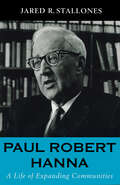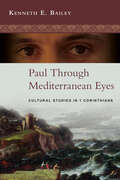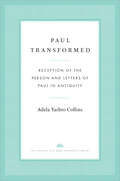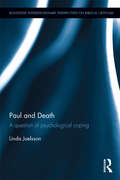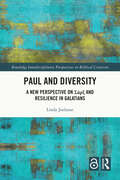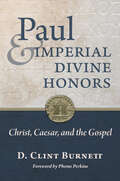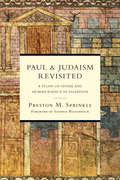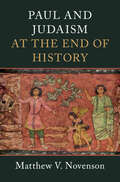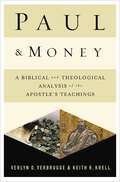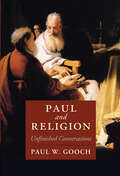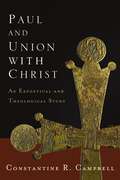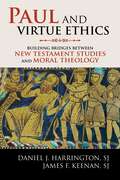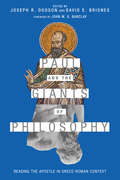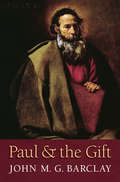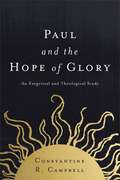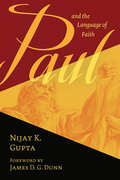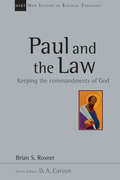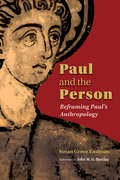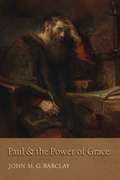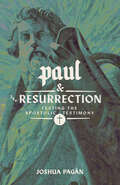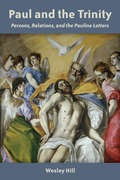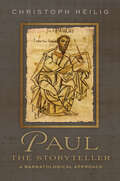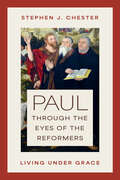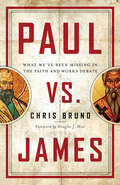- Table View
- List View
Paul Robert Hanna: A Life of Expanding Communities
by Jared R. StallonesAnalyzing and ultimately placing in context Paul Hanna's vast contributions, this book provides a richly textured narrative of his life and his major role in twentieth-century American education and the development of modern American education.
Paul Through Mediterranean Eyes: Cultural Studies in 1 Corinthians
by Kenneth E. BaileyChristianity TodayPaul was a Hebrew of the Hebrews, steeped in the learning of his people.But he was also a Roman citizen who widely traveled the Mediterranean basin, and was very knowledgeable of the dominant Greek and Roman culture of his day. These two mighty rivers of influence converge in Paul's first letter to the Corinthians.With razor-sharp attention to the text, Kenneth Bailey examines the cultural milieu and rhetorical strategies that shaped this pivotal epistle. He discovers the deep layers of the Hebraic prophetic tradition informing Paul's writing, linking the Apostle with the great prophets of the Old Testament.Throughout, Bailey employs his expert knowledge of Near Eastern and Mediterranean culture to deliver to readers a new understanding of Paul and his world. Familiar passages take on a new hue as they are stripped of standard Western interpretations and rendered back into their ancient setting.
Paul Transformed: Reception of the Person and Letters of Paul in Antiquity (The Anchor Yale Bible Reference Library)
by Adela Yarbro CollinsA fascinating reception history of the theological, ethical, and social themes in the letters of Paul In the first decades after the death of Jesus, the letters of the apostle Paul were the chief written resource for Christian believers, as well as for those seeking to formulate Christian thought and practice. But in the years following Paul's death, the early church witnessed a proliferation of contested—and often opposing—interpretations of his writings, as teaching was passed down, debated, and codified. In this engaging study, Adela Yarbro Collins traces the reception history of major theological, ethical, and social topics in the letters of Paul from the days of his apostleship through the first centuries of Christianity. She explores the evolution of Paul&’s cosmic eschatology, his understanding of the resurrected body, marriage and family ethics, the role of women in the early church, and his theology of suffering. Paying special attention to the ways these evolving interpretations provided frameworks for church governance, practice, and tradition, Collins illuminates the ways that Paul&’s ideas were understood, challenged, and ultimately transformed by their earliest audiences.
Paul and Death: A Question of Psychological Coping (Routledge Interdisciplinary Perspectives on Biblical Criticism)
by Linda JoelssonThe concept of death, particularly violent death, is prevalent throughout the writings of Paul the Apostle. His letters in the New Testament address this topic from a variety of perspectives, some of which can appear to be almost contradictory. However, this need not be problematic. Paul and Death uses the method of psychological exegesis to show that the different attitudes toward death in Paul’s letters make for a much more coherent discourse if they are seen as an aid to individual and collective psychological coping. Taking the differences between each of Paul’s letters as its starting point, this study suggests that a variety of coping strategies in relation to death may be beneficial depending on the situation, the person, and the stage of the coping process. Drawing on psychologically-oriented hermeneutic theory, and theories about psychological coping in particular, the author argues that each case of psychological coping must be understood in its historical situation, and as strategies emanating from a specific person’s subjective appraisal. Combining theology and biblical studies with modern psychology, this book will be of particular interest to academics and students that are studying the relationship between Religion and notions of Death.
Paul and Diversity: A New Perspective on Σάρξ and Resilience in Galatians (Routledge Interdisciplinary Perspectives on Biblical Criticism)
by Linda JoelssonThis book investigates attitudes toward diversity as expressed in Paul’s letter to the Galatians and proposes a renewed understanding of the term σάρξ as used in this letter. Σάρξ (sarx) is usually translated as "flesh" and has often been perceived in theological studies as a complicated and highly polysemous term. It is also a word whose interpretations have had far-reaching social, political, and religious consequences throughout history. The author argues in this volume that for Paul the term σάρξ is commonly adopted with reference to the collective group, and in light of a sense of collective identity in particular. A key assertion is that Paul was and remained a Jew and also continued to be deeply concerned with the prospects for the peaceful co-existence of Jews and Gentiles in the assemblies of God. The chapters draw on perspectives from classical rhetoric, modern linguistics, and social systems theory in order to describe the communicative structure of the letter, the construct of collective identity as described within this setting, and the potential for resilience in this construct. Offering a more coherent reading of Galatians, the book contributes positively to current discussions in Pauline studies and will be of interest to scholars of biblical studies and theology.
Paul and Imperial Divine Honors: Christ, Caesar, and the Gospel
by D. Clint BurnettHow did the imperial cult affect Christians in the Roman Empire? &“Jesus is lord, not Caesar.&” Many scholars and preachers attribute mistreatment of early Christians by Roman authorities to this fundamental confessional conflict. But this mantra relies on a reductive understanding of the imperial cult. D. Clint Burnett examines copious evidence—literary, epigraphic, numismatic, and archaeological—to more accurately reconstruct Christian engagement with imperial divine honors. Outdated narratives often treat imperial divine honors as uniform and centralized, focusing on the city of Rome. Instead, Burnett examines divine honors in Philippi, Thessalonica, and Corinth. While all three cities incorporated imperial cultic activity in their social, religious, economic, and political life, the purposes and contours of the practice varied based on the city&’s unique history. For instance, Thessalonica paid divine honors to living Julio-Claudians as tribute for their status as a free city in the empire—and Christian resistance to the practice was seen as a threat to that independence. Ultimately, Burnett argues that early Christianity was not specifically antigovernment but more broadly countercultural, and that responses to this stance ranged from conflict to apathy. Burnett&’s compelling argument challenges common assumptions about the first Christians&’ place in the Roman Empire. This fresh account will benefit Christians seeking to understand their faith&’s place in public life today.
Paul and Judaism Revisited: A Study of Divine and Human Agency in Salvation
by Preston M. SprinklePreaching's Preacher's Guide to the Best Bible Reference for 2014 (Pauline Studies) Ever since E. P. Sanders published Paul and Palestinian Judaism in 1977, students of Paul have been probing, weighing and debating the similarities and dissimilarities between the understandings of salvation in Judaism and in Paul. Do they really share a common notion of divine and human agency? Or do they differ at a deep level? And if so, how? Broadly speaking, the answers have lined up on either side of the old perspective and new perspective divide. But can we move beyond this impasse? Preston Sprinkle reviews the state of the question and then tackles the problem. Buried in the Old Testament's Deuteronomic and prophetic perspectives on divine and human agency, he finds a key that starts to turn the rusted lock on Paul's critique of Judaism. Here is a proposal that offers a new line of investigation and thinking about a crucial issue in Pauline theology.
Paul and Judaism at the End of History
by Matthew V. NovensonThe apostle Paul was a Jew. He was born, lived, undertook his apostolic work, and died within the milieu of ancient Judaism. And yet, many readers have found, and continue to find, Paul's thought so radical, so Christian, even so anti-Jewish – despite the fact that it, too, is Jewish through and through. This paradox, and the question how we are to explain it, are the foci of Matthew Novenson's groundbreaking book. The solution, says the author, lies in Paul's particular understanding of time. This too is altogether Jewish, with the twist that Paul sees the end of history as present, not future. In the wake of Christ's resurrection, Jews are perfected in righteousness and – like the angels – enabled to live forever, in fulfilment of God's ancient promises to the patriarchs. What is more, gentiles are included in the same pneumatic existence promised to the Jews. This peculiar combination of ethnicity and eschatology yields something that looks not quite like Judaism or Christianity as we are used to thinking of them.
Paul and Money: A Biblical and Theological Analysis of the Apostle’s Teachings and Practices
by Verlyn Verbrugge Keith R. KrellThe apostle Paul, one of the most prominent figures in the early Jesus movement, had a lot to say about money. His letters deal with real people as they lived their Christian lives in the Greco-Roman world. He finds it necessary to address “those who are rich in this present world” (1 Tim 6:17). But he also has to address those do not want to work, for whatever reason, and are “idle and disruptive” (2 Thess 3:6). Moreover, whereas most churches today have a certain socio-economic homogeneity, some of Paul’s churches had a combination of upper class wealthy people and lower class slaves worshiping side-by-side, and it inevitably created friction (esp. 1 Cor 11:17–34). During the past twenty years a significant amount of research has been done on class-consciousness in the Greco-Roman world and on the significance of Paul’s fund-raising venture “for the poor among the Lord’s people in Jerusalem”—“the collection”—for his ministry. Relying on the surprising results of current Pauline scholarship and a careful exegesis of a variety of New Testament texts, this book offers a thorough investigation of the apostle Paul’s sayings and dealings with money.
Paul and Religion: Unfinished Conversations (Cambridge Studies in Religion, Philosophy, and Society)
by Paul W. GoochPaul and Religion demonstrates the continuing and contemporary relevance of the most important, and most controversial, figure of early Christianity. Paul Gooch interrogates the Pauline writings for their meaning as well as implications for religion as an entire form of life, a stance on the world expressed in distinctive practices. Bringing a philosophical approach to this topic, he connects Paul's ideas to lived experience. In a conversational style, Gooch explores Paul's experience of grace and his dismissal of distinctive markers of religious identity in favour of love as binding together a community. Contrary to common expectations, he finds within Paul's letters material for conversations about issues in our day, such as gender and sexuality. From his close reading of the Letters, Gooch argues that the Pauline religious form of life is not identical with institutional Christianity. Indeed, his conclusions may be welcome to those who belong to other faiths.
Paul and Union with Christ: An Exegetical and Theological Study
by Constantine R. CampbellPaul and Union with Christ fills the gap for biblical scholars, theologians, and pastors pondering and debating the meaning of union with Christ. Following a selective survey of the scholarly work on union with Christ through the twentieth century to the present day, Greek scholar Constantine Campbell carefully examines every occurrence of the phrases ‘in Christ’, ‘with Christ’, ‘through Christ’, ‘into Christ,’ and other related expressions, exegeting each passage in context and taking into account the unique lexical contribution of each Greek preposition. Campbell then builds a holistic portrayal of Paul’s thinking and engages contemporary theological discussions about union with Christ by employing his evidence-based understanding of the theme. This volume combines high-level scholarship and a concern for practical application of a topic currently debated in the academy and the church. More than a monograph, this book is a helpful reference tool for students, scholars, and pastors to consult its treatment of any particular instance of any phrase or metaphor that relates to union with Christ in the Pauline corpus.
Paul and Virtue Ethics: Building Bridges Between New Testament Studies and Moral Theology
by Daniel J Harrington S.J. James Keenan SJDaniel Harrington, SJ, and James Keenan, SJ, approach moral theology through virtue ethics, asking the key questions, Who am I? Who do I want to become? And how do I get there? With the apostle Paul as a guide, the authors examine the virtues that flow from Scripture and provide a lens through which to interpret Scripture. They explore theological virtues faith, hope, and love; natural virtues and vices; social ethics, and sexual ethics.
Paul and the Giants of Philosophy: Reading the Apostle in Greco-Roman Context
by Joseph R. DodsonWhat forces shaped the intellectual world of the apostle Paul? How familiar was he with the great philosophers of his age, and to what extent was he influenced by them? When he quoted Greco-Roman sources, what was his aim? Pauline scholars wrestle with such questions in journal articles and technical monographs, but now Paul and the Giants of Philosophy brings the conversation into the college classroom and the church. Each essay addresses Paul's interaction with Greco-Roman philosophical thinking on a particular topic, such as faith, slavery, gift-giving, and the afterlife. And each chapter includes discussion questions and reading lists to help readers engage the material further. Dodson and Briones have gathered contributors with diverse views from various traditions who are united in the desire to make Paul's engagement with ancient philosophy accessible to many readers.
Paul and the Gift
by John M. BarclayA fresh scholarly reading of grace in Paul's theology In this book esteemed Pauline scholar John Barclay presents a strikingly fresh reading of grace in Paul's theology, studying it in view of ancient notions of "gift" and shining new light on Paul's relationship to Second Temple Judaism.Paul and the Gift centers on divine gift-giving, which for Paul, Barclay says, is focused and fulfilled in the gift of Christ. He offers a new appraisal of Paul's theology of the Christ-event as gift as it comes to expression in Galatians and Romans, and he presents a nuanced and detailed discussion of the history of reception of Paul. This exegetically responsible, theologically informed, hermeneutically useful book shows that a respectful, though not uncritical, reading of Paul contains resources that remain important for Christians today.
Paul and the Hope of Glory: An Exegetical and Theological Study
by Constantine R. CampbellA Unique Study of Pauline Eschatology that Is Both Exegetical and TheologicalOne of the trajectories coming out of Constantine Campbell's award-winning book Paul and Union with Christ is the significance of eschatology for the apostle. Along with union with Christ, eschatology is a feature of Paul&’s thinking that affects virtually everything else.While union with Christ is the "webbing" that joins Paul's thought together, eschatology provides the "shape" of his thought, and thus gives shape to his teaching about justification, resurrection, the cross, ethics, and so forth. There is considerable debate, however, about Paul's eschatology, asking whether he is a "covenant" or an "apocalyptic" theologian.In Paul and the Hope of Glory Campbell conducts a thorough exegetical study of the relevant elements of Paul's eschatological language, metaphors, and images including "parousia," "the last day," "inheritance," "hope," and others. He examines each passage in context, aiming to build inductively an overall sense of Paul's thinking. The results of this exegetical study then feed into a theological study that demonstrates the integration of Paul's eschatological thought into his overall theological framework.The study is comprised of three parts:The first part introduces the key issues--both exegetical and theological--and sets the parameters and methodology of the book. It also offers an historical survey of the scholarly work produced on Paul's eschatology through the twentieth century to the present day.The second part contains the detailed exegetical analysis, with chapters on each important Pauline phrase, metaphor, and image related to eschatology.The third part turns its attention to theological synthesis. It recapitulates relevant conclusions from the evidence adduced in part two and launches into theological discussion engaging current issues and debates.This volume combines high-level scholarship and a concern for practical application of a topic currently debated in the academy and the church. More than a monograph, this book is a helpful reference tool for students, scholars, and pastors to consult its treatment of any particular instance of any phrase or metaphor that relates to eschatology in Paul's thinking.
Paul and the Language of Faith
by Nijay K. GuptaA dynamic reading of Paul&’s faith language, outlining its subtle nuances as belief, trust, and faithfulness.Faith language permeates the letters of Paul. Yet, its exact meaning is not always clear. Many today, reflecting centuries of interpretation, consider belief in Jesus to be a passive act. In this important book, Nijay Gupta challenges common assumptions in the interpretation of Paul and calls for a reexamination of Paul&’s faith language. Gupta argues that Paul&’s faith language resonates with a Jewish understanding of covenant involving goodwill, trust, and expectation. Paul&’s understanding of faith involves the transformation of one&’s perception of God and the world through Christ, relational dependence on Christ, as well as active loyalty to Christ. Pastors and scholars alike will benefit from this close examination of Paul&’s understanding and use of faith language. For Gupta, Paul&’s understanding involves a divine-human relationship centered on Christ that believes, trusts, and obeys.
Paul and the Law: Keeping the Commandments of God (New Studies in Biblical Theology #Volume 31)
by Brian S. RosnerPreaching's Preacher's Guide to the Best Bible Reference for 2014 (Pauline Studies) "For neither circumcision counts for anything nor uncircumcision, but keeping the commandments of God" (1 Cor 7:19). The apostle Paul's relationship to the Law of Moses is notoriously complex and much studied. Difficulties begin with questions of definition (of the extent of Paul's corpus and the meanings of "the law") and are exacerbated by numerous problems of interpretation of the key texts. Major positions are entrenched, yet none of them seems to know what to do with all the pieces of the puzzle. Inextricably linked to Paul's view of the law is his teaching concerning salvation history, Israel, the church, anthropology, ethics and eschatology. Understanding "Paul and the law" is critical to the study of the New Testament, because it touches on the perennial question of the relationship between the grace of God in the gift of salvation and the demand of God in the call for holy living. Misunderstanding can lead to distortions of one or both. This fresh and valuable study is something of a breakthrough, bringing neglected evidence to the discussion and asking different questions of the material, while also building on the work of others. Brian Rosner argues that Paul undertakes a polemical re-evaluation of the Law of Moses, which involves not only its repudiation as law-covenant and its replacement by other things, but also its wholehearted re-appropriation as prophecy (with reference to the gospel) and as wisdom (for Christian living).
Paul and the Person: Reframing Paul's Anthropology
by Susan Grove EastmanIn this book Susan Grove Eastman presents a fresh and innovative exploration of Paul&’s participatory theology in conversation with both ancient and contemporary conceptions of the self. Juxtaposing Paul, ancient philosophers, and modern theorists of the person, Eastman opens up a conversation that illuminates Paul&’s thought in new ways and brings his voice into current debates about personhood.
Paul and the Person: Reframing Paul's Anthropology
by Susan Grove EastmanIn this book Susan Grove Eastman presents a fresh and innovative exploration of Paul&’s participatory theology in conversation with both ancient and contemporary conceptions of the self. Juxtaposing Paul, ancient philosophers, and modern theorists of the person, Eastman opens up a conversation that illuminates Paul&’s thought in new ways and brings his voice into current debates about personhood.
Paul and the Power of Grace
by John M. BarclayPaul and the Gift transformed the landscape of Pauline studies upon its publication in 2015. In it, John Barclay led readers through a recontextualized analysis of grace and interrogated Paul&’s original meaning in declaring it a &“free gift&” from God, revealing grace as a multifaceted concept that is socially radical and unconditioned—even if not unconditional. Paul and the Power of Grace offers all of the most significant contributions from Paul and the Gift in a package several hundred pages shorter and more accessible. Additionally, Barclay adds further analysis of the theme of gift and grace in Paul&’s other letters—besides just Romans and Galatians—and explores contemporary implications for this new view of grace.
Paul and the Resurrection: Testing the Apostolic Testimony
by Joshua A. PagánFor the contemporary believer, Paul's role in the historical setting of the Resurrection is far more than a matter of theological curiosity. The Christian justification for rational belief in the Resurrection is in large part anchored in Paul's justification for rational belief in the authenticity of his own experience. In Paul we find the earliest and best attested documentary evidence for a historical investigation of the miraculous event. Moreover, his epistles are an indispensable source of independent corroboration of the gospel narratives. Opponents of Christianity have formulated a variety of hypotheses to account for Paul's experience on the Damascus Road. Some propose that Paul was deceptive; others argue that he was deluded; and still others contend he came to believe a legendary development. Yet according to the Christian hypothesis, Paul's claim to have encountered the risen Jesus is dependable, and his testimony can be shown to withstand the scrutiny of critics. In this innovative, interdisciplinary study, PagÁn combines the analytic tools of history and philosophy to explore and evaluate competing explanations of Paul's belief in the Resurrection of Jesus.
Paul and the Trinity: Persons, Relations, and the Pauline Letters
by Wesley HillPaul’s ways of speaking about God, Jesus, and the Spirit are intricately intertwined: talking about any one of the three, for Paul, implies reference to all of them together. However, much current Pauline scholarship discusses Paul’s God-, Christ-, and Spirit-language without reference to trinitarian theology.In contrast to that trend, Wesley Hill argues in this book that later, post-Pauline trinitarian theologies represent a better approach, opening a fresh angle on Paul’s earlier talk about God the Father, Jesus Christ, and the Spirit. Hill looks critically at certain well-known discussions in the field of New Testament studies -- those by N. T. Wright, Richard Bauckham, Larry Hurtado, and others -- in light of patristic and contemporary trinitarian theologies, resulting in an innovative approach to an old set of questions.Adeptly integrating biblical exegesis and historical-systematic theology, Hill’s Paul and the Trinity shows how trinitarian theologies illumine interpretive difficulties in a way that more recent theological concepts have failed to do.Watch a 2015 interview with the author of this book here:
Paul the Storyteller: A Narratological Approach
by Christoph HeiligAn incisive study of Paul&’s use of stories and narratives in his letters Paul is often thought of as a crafter of numerous and complex arguments, but some scholars, such as N. T. Wright and Richard Hays, have shown that narratives are vitally important in his letters. Through careful examination of the texts, Christoph Heilig demonstrates that Paul is indeed a talented teller of stories—not only explicit narratives but also implicit stories. In this volume, after a decade of research and writing, Heilig presents his definitive report on narrative in Paul. While Richard Hays and N. T. Wright have argued that Paul&’s letters contain implicit narratives, Heilig stresses that a sound methodology requires beginning with text-linguistic investigation of explicit narratives. As Heilig argues, focusing on explicit narratives repeatedly redirects our attention to implicit (&“almost&”) stories. On this basis, he shows that Hays&’s &“narrative substructures&” and Wright&’s &“worldview&” narratives can also be fruitfully integrated into a narratological approach. Paul is a different kind of storyteller than the gospel writers, for example, but at countless points miniature narratives play a crucial role for Paul&’s communicative goals. Students and scholars of the New Testament will welcome Heilig&’s expert guidance through a hotly debated area of Pauline studies.
Paul through the Eyes of the Reformers: Living under Grace
by Stephen J. ChesterA brilliant reappraisal of Protestant Reformers&’ views on Paul In this incisive book, Stephen Chester challenges misconceptions and provides new insights into how sixteenth-century Protestant Reformers interpreted the writings of Paul. Writing for those who are interpreting Pauline letters in and for today&’s world, Chester demonstrates the value of a nuanced and accurate understanding of the Reformers&’ views on Paul. Throughout the book, Chester draws on key ideas from his monumental work Reading Paul with the Reformers, which won Christianity Today&’s book of the year award in biblical studies. In Paul through the Eyes of the Reformers, Chester updates the argument and presents the ideas in a shorter and more accessible form designed for a broad readership. To help readers better understand the Reformers&’ historical and theological context, Chester surveys perspectives on Paul prior to the sixteenth century. Against this background, Chester illuminates the paradigm shifts in Pauline interpretation that unfolded during the Reformation, paying special attention to the work of Martin Luther, Philip Melanchthon, and John Calvin. He also discusses the promise and challenge of reading Paul with the Reformers today, highlighting the importance of engaging with the Reformers&’ work critically, reaching different conclusions from them where necessary, and taking inspiration from them when appropriate. Paul through the Eyes of the Reformers is a remarkable resource for biblical scholars who care about Paul and his theology.
Paul vs. James: What We've Been Missing in the Faith and Works Debate
by Chris Bruno"I welcome Chris Bruno&’s readable and thoroughly biblical exploration of faith and works. He sets the matter in both its wider biblical context at the same time as he makes clear its relevance and importance to faithful Christian living today." –Douglas J. Moo from the ForewordEverything you never knew about the men behind the controversy.Put James and Paul next to each other and some tough-to-answer questions come up. Paul says we&’re saved by faith alone, not works—and James seems to say the opposite. If you&’ve been around the church for a while, you probably know enough to say "the right thing" if someone asked about these verses. But would your answers hold up to scrutiny? If pressed, would you know what to say? Dive into the life stories of both apostles, learn more about the context of their letters, and discover the truth about the shared message they both proclaimed. No more canned answers or lingering questions, gain confidence and go deeper in Paul vs. James.
